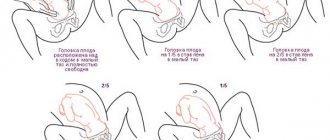Three components
Many women are confident that childbirth will take place naturally and that the body knows better how to cope with this. But there is another category of expectant mothers who firmly believe that you need to be prepared for childbirth, both mentally and physically! And they are right. When the moment of labor comes, various nuances may arise. So it’s better to know about them and be prepared for them.
In general, it is better to start preparing for the birth of a baby from the very beginning, in the first trimester of pregnancy. But we will talk about how to spend the last weeks of pregnancy and be as ready as possible to meet the baby. In general, two components of preparation are identified: emotional and physical sides. But there is another one - educational, thanks to which you can properly tune your spirit and body.
Threat in early pregnancy
Most often, the threat of miscarriage occurs in the early stages. Sometimes it is not possible to establish the causes of this phenomenon. Every fifth pregnancy ends in early miscarriage.
It’s interesting that in the West they often don’t even try to maintain a pregnancy in the first weeks if there is a threat. It is believed that the body itself has the power to decide whether the fetus will be viable.
Domestic medicine is not so categorical: any threat of miscarriage means sending the woman to hospitalization.
The most common causes of threatened spontaneous abortion:
- Hormonal disorders . Progesterone deficiency can interfere with the successful development of pregnancy. If the corpus luteum does not cope with its function properly, hormonal failure occurs. The female body lacks the hormone that supports pregnancy . This can happen due to endocrine problems, increased levels of male hormones and certain medications.
- Pathologies of the structure of the reproductive organs . For example, a horn-shaped or saddle-shaped uterus. Irregular structure of organs is not a hindrance to pregnancy, but increased medical supervision will not be superfluous.
- Genetic abnormalities . Serious chromosomal mutations lead to spontaneous miscarriage; nature discards the non-viable fetus.
- Isthmic-cervical insufficiency . Serious and widespread pathology. For some reason, the cervix loses its ability to be a protective point for the baby’s intrauterine life and begins to open. If this is not prevented, a miscarriage will occur.
- Injuries . Falls, physical stress, and wounds can cause miscarriage.
- Taking illicit medications . In the first trimester, any medications are prohibited: a doctor can prescribe them, and he does this only if absolutely necessary.
A threat can be identified by the following characteristics:
- severe or persistent pain in the lower abdomen;
- bleeding;
- bleeding from the vagina;
- sharply deteriorated health;
- severe, exhausting vomiting.
Even the healthiest woman can experience problems in the early stages of pregnancy. Only a doctor can dispel fears and provide timely, competent assistance.
Physical training
Our body needs care. If we treat it correctly, it reciprocates and makes us feel good. A pregnant woman is not a diagnosis. She is not sick, she is bearing a new life within herself. This means that the expectant mother must be responsible, especially when the last weeks of pregnancy begin, because she contains a fully formed baby, gaining strength to go out into the world. A pregnant woman should lead an active and healthy lifestyle. There is no need to fall on the bed and be afraid to move again, the muscles should work.
Moderate physical activity is necessary to strengthen muscles. This will prevent excess weight from accumulating and will help facilitate the birth process. Of course, we are not talking about the pathology of pregnant women when there is a threat of premature birth. Remember, you should always consult your doctor! Even if before pregnancy the woman was a professional athlete. Only in the absence of contraindications can you engage in physical activity, especially in the last weeks of pregnancy, when there is noticeable pressure on the lower part of the pelvis.
What's good and what's not?
For expectant mothers, it is useful to walk in the fresh air, perform basic yoga asanas, and swim in the pool. Thanks to these simple actions, you can develop flexibility, endurance, and relieve tension from your back. Water aerobics, designed specifically for pregnant women, has a very beneficial effect on all muscle groups.
If before pregnancy a woman went to the gym, then you can attend training, but significantly reduce the load and reconsider the set of exercises. You should not lift heavy weights, do abdominal exercises, or generally train intensely.
Changes in blood pressure and dizziness
In most cases, high or normal blood pressure decreases in early pregnancy. It may also cause you to feel dizzy as your blood vessels dilate.
High blood pressure as a result of pregnancy is more difficult to notice. Almost all cases of hypertension during the first 20 weeks indicate an underlying problem. It can develop either in the early stages of pregnancy or be present beforehand.
Your doctor will measure your blood pressure during your first visit to establish a normal baseline level.
Hints
- If you haven't already done so, consider reducing your load and switching to pregnancy exercises when you're staying fit.
- Learn how to monitor your blood pressure regularly.
- Ask your doctor about a personalized nutrition plan to help lower your blood pressure.
- Drink enough water and eat snacks to prevent dizziness. Also try not to make sudden movements, in particular, avoid abruptly rising from a chair.
Strengthening the most important part of the body of expectant mothers
To strengthen the pelvic muscles in the last weeks of pregnancy, and throughout the entire period of bearing a baby, it is useful to perform Kegel exercises. This will help improve blood circulation, prevent ruptures during labor and the occurrence of hemorrhoids. If your pelvic floor muscles are strong, childbirth will be easier and faster.
The “cat” exercise is very popular. It really relieves pain in the last weeks of pregnancy that occurs in the back. It is easy to perform: you need to get on all fours, straighten your arms, knees and palms rest on the floor. Next, you need to alternately round and arch your back, holding each position for a count of eight. You need to do ten approaches in total.
Another well-known and well-proven exercise that relieves back pain in the last weeks of pregnancy is the “butterfly”. It helps open the pelvis, relieve tension and prepare joints for childbirth. To perform the exercise, you need to sit on the floor, straighten your back, spread your knees, and bring your feet together. Feeling the tension on the inner side of the thigh, press on the thighs in places on the inner side next to the knees. The legs should go down and stay in this position for a little while. You can make the exercise even more difficult by reaching forward with your arms. Sometimes the butterfly is performed while lying on your back.
Nutrition
The question often arises: what to do if a woman experiences swelling in the last weeks of pregnancy? The first is to change your diet. Before childbirth, the body needs unloading. Heavy, fatty, fried, canned food will not bring any benefit. This also applies to flour products. It is better to exclude such products from the diet. Mother and child need nutrients, vitamins, but do not need heaviness! The meat should be lean, boiled or baked. The same applies to fish. In principle, you should not abuse meat products and eggs. 2-3 times a week is enough. It is better to eat more baked vegetables and fruits. Fermented milk products will also bring benefits, however, you always need to monitor their freshness!
To prevent constipation and increase tissue elasticity, it is recommended to add a little vegetable oil, preferably olive, to food. By understanding what to do in the last weeks of pregnancy and focusing on proper nutrition, a woman can be well prepared for the most important moment in her life. Then the birth will be as painless as possible, without negative consequences for the health of mother and baby. Light and healthy food will help a woman maintain normal weight in the last weeks of pregnancy, cleanse the body of toxins and go into labor without unnecessary heaviness.
Alcohol and pregnancy: is it okay to have at least a little bit?
Miscarriage, intrauterine growth retardation, fetal alcohol syndrome, heart defects, hydrocephalus, mental retardation - these are just some of the diagnoses that can be given to a woman who drinks alcohol in the early stages of pregnancy.
Early term - how long?
We are talking about the period from 3 to 13 weeks, when the internal organs of the unborn child are formed and developed.
If you drank without yet knowing about your pregnancy (up to 3 weeks), and it persists, then for a successful pregnancy it is enough to stop drinking alcohol.
What you drink at this stage has not yet had time to cause harm to the fetus. The worst event is the egg being rejected and pregnancy not occurring.
Is alcohol really that bad?
Some people simply don't fully understand the effects of alcohol in early pregnancy. Any alcohol-containing drink is absorbed into the blood very quickly. The placenta will not protect the fetus, meaning you are sharing alcohol with your baby.
Remember this every time you unbearably want “one small glass.” Toxins pass freely and linger in the child’s still undeveloped body, having a negative impact on literally everything: the brain, heart, liver, kidneys.
But the fetus is not yet able to quickly remove alcohol from the cells on its own.
Another important factor: abnormalities associated with alcohol consumption in the early stages of pregnancy can be seen at 12-14 weeks, i.e. when you no longer have an abstract fetus, but a fully formed child. Sometimes even after birth, but you can’t turn back time.
Beer
Traditionally, the drink is prepared from water, yeast, hops, and malt. At first glance, there is nothing harmful in the composition.
Then where does the degree in beer come from? Alcohol is formed as a result of fermentation, passing from a bottle, jar, glass straight into your body and to your unborn baby.
Manufacturers also add preservatives to increase the shelf life of the product and its taste. Is it really so important to drink beer during early pregnancy to risk the health of your baby?
Alcohol is not the only thing that forms in a drink. Nitrogen-containing substances, phenolic compounds, phytoestrogen obtained from hops - a woman drinking beer in the early stages of pregnancy “feeds” her baby with all of this.
Nonalcoholic beer
Without alcohol, beer is just a cocktail, some pregnant women reassure themselves. Harmless and safe. But it is not so. Alcohol is removed from beer not by 100%, but by 95%.
That is, a small percentage of alcohol is still present. Other harmful components, including preservatives, do not evaporate anywhere.
And if you combine alcohol and smoking in the early stages of pregnancy, the consequences can be disastrous.
Wine
A drink that some do not consider alcoholic. But it still contains alcohol. Is this factor not enough to give up wine? Then think about how the grapes were treated against diseases and insects? Probably not the most natural fertilizer.
Of course, this will not harm a healthy adult, but what about a fetus that is not fully formed? No studies have been conducted, which means it is impossible to say unequivocally about safety.
So is it possible to drink wine in the early stages of pregnancy in small quantities? You can, if you are ready to take responsibility for any possible deviations in the development of the fetus.
The consequences of drinking alcoholic beverages on the body of the expectant mother
Strong alcohol
While ordinary people, scientists, and doctors are still arguing about the dangers of beer and wine in the early stages of pregnancy, all experts unanimously veto strong drinks. Whiskey, vodka, cognac, rum will bring you and your baby nothing but harm...
But alcohol includes not only strong drinks, but also:
- low alcohol (wine, champagne, beer (including live beer), alcohol tinctures);
- homemade wines, liqueurs, liqueurs;
- cocktails containing the above components.
Kvass and kefir: alcoholic drinks or not?
Both products are the result of fermentation; accordingly, alcohol is present there, albeit in negligible quantities.
Kvass
It is better to immediately exclude store-bought kvass from the diet for the same reason as non-alcoholic beer. But homemade bread kvass, which you prepare with your own hands, can be drunk in small quantities as a soft drink. Reasons why you should limit your consumption of kvass:
- provokes the formation of gases, which, in turn, increases the tone of the uterus;
- swelling is another side effect of kvass;
- can become a problem with a weak gastrointestinal tract: aggravates gastritis and ulcers.
Kefir
There is so little alcohol in kefir that its beneficial properties offset possible harm. Kefir helps fight toxicosis, prevent weight gain, remove swelling and normalize the functioning of the gastrointestinal tract. Pregnant women, even in the early stages, can safely consume kefir, adhering to the dose recommended for an adult: 1-2 glasses in the evening, preferably before bed.
How can you replace the beneficial properties of beer and wine?
The harmful effect that alcohol has on the body during pregnancy in the early stages is many times greater and offsets the benefits. All the beneficial effects of wine and beer can be replaced with safe products.
| Increase in hemoglobin | Walnuts, caviar, pomegranate juice, dishes from the liver, heart, kidneys, tongue. Blackcurrant, cranberry, strawberry, raspberry. Apples, pomegranates, persimmons, quince. Legumes, buckwheat, rye. |
| Awakening your appetite | Green vegetables, grapes, herbal infusions (in consultation with the doctor), permitted physical activity: swimming pool, yoga, walks (also in agreement with the doctor). Cooking dishes with ginger, cumin. |
| Saturation with vitamins | Taking vitamin and mineral complexes according to your tests, eating vegetables and fruits, fermented milk products, legumes. |
| Relieves tension and improves mood | Massage, yoga with a doctor’s permission, psychological training, watching comedies, reading good books. |
| Normalization of pressure | Plenty of water, celery, strawberries, iodized salt. Wearing compression stockings, contrast shower. |
| Quenching your thirst | Clean drinking water. Jam diluted in warm water. Dried fruits compote. Lightly brewed tea, herbal infusions. Milk, fermented baked milk, drinking yogurt. Juice. |
Harmful useful advice
The good-heartedness of neighbors at the table, friends and relatives who feel sorry for a pregnant woman pouring herself juice at a common table serves a disservice.
Don't listen to this:
- “A couple of glasses of high-quality red wine are even beneficial for a pregnant woman: they increase hemoglobin and improve blood”
Perhaps hemoglobin increases. But it reduces the chances of having healthy offspring. Remember: the type of drink does not matter (beer, wine, vodka, cognac) - they are all equally harmful.
- “If the body demands it, it means it lacks the elements contained in wine and beer. You can have a glass! Such a dose will not do anything; a little alcohol in the early stages of pregnancy will not affect anything.”
The elements can be obtained by eating less harmful foods. Replenish the lack of vitamin B (if you are craving beer) with carrots, hemoglobin (if you are craving wine) will be increased by liver dishes, pomegranate, and hematogen.
You won't take powerful antibiotics to cure a cold, will you? Correct, because there is a chance of causing more harm than good.
And the influence of alcohol on pregnancy in the early stages can cause serious disturbances in the appearance of the fetus and its internal organs.
- “You don’t abuse it, but you drink rarely. Nothing critical will happen."
There is some truth in this: a sip of wine by itself will not lead to irreversible consequences. But it can be the “last straw” for the body, loaded with stress, poor environment, nervous work, lack of vitamins, and now also pregnancy. Why do you need an extra negative factor?
- “An expectant mother should not deny herself anything.”
On the contrary, you should give up alcohol in the early stages of pregnancy, smoking, extreme sports, hazardous work, and food.
If you live without denying yourself anything, there is a high risk of losing not only your health, but also your child.
- “A sip of wine (a glass of beer, a glass of whiskey) is a safe dose of alcohol.”
The concept of “safe dose” does not exist in official world medicine. One organism can cope with a glass; for another, a sip is fatal.
Do you know your body well enough to allow yourself to take risks? If you drink alcohol in the early stages of pregnancy, the risk of not only congenital diseases in the child increases, but also increases the chances of not waiting at all, causing a miscarriage.
- “I drank wine for 9 months and gave birth to a healthy child! There he is running..."
Needless to say, everyone’s body is different and so is their health. If a woman suddenly gives birth to a baby with disabilities, where will the advisers be? That's right, overboard.
They will shrug their shoulders, and you will be left with hospitals, rehabilitation centers, and special development schools. It is unlikely that this path is assumed when agreeing to drink alcohol for company at an early stage of pregnancy. You will have to deal with the consequences yourself.
As practice shows, sick children are rarely needed by their fathers, so what kind of friends can we say?
- “A pregnant woman is also a person...”
Absolutely right, so she will ignore all the advice of well-wishers and independently draw the right conclusions. If drinking alcohol in the early stages of pregnancy becomes simply a necessity of life, then maybe you shouldn’t have thought about the child at all?
Summarizing all of the above, the unequivocal answer to the question “Is it possible to drink in the early stages” will be unequivocal: “No!” Before you take a sip, remember two things:
- the harm from alcohol is always higher than the potential benefits;
- You will never give beer or wine to a newborn: so is it necessary to give him something to drink when he is not yet born, to please his desires?
What do you think about the effect of alcohol on early pregnancy?
We recommend reading the article: Can you drink coffee during pregnancy in the first trimester? From it you will find out who is allowed to drink it, and who may face serious consequences from drinking it, get acquainted with the opinions of pregnant women and dispel all myths about the drink.
Source: https://7mam.ru/alkogol-pri-beremennosti/
Psychology
In order to be emotionally ready, you first need to get enough rest. A pregnant woman must have healthy sleep! In addition, she mentally establishes a connection with her baby, talks to him, strokes his tummy and imagines how she will cherish him in her arms. The expectant mother must understand and accept her position, establish a connection with the unborn baby, and organize a comfortable regime for herself.
There is no need to be afraid of the upcoming event; childbirth will pass and be forgotten. A woman’s body is designed in such a way that, holding a newborn in her arms, she forgets about all the unpleasant sensations.
To cope with your fears, you can visit a psychologist. The main thing is awareness, watch films, find out how everything happens, read literature. Understanding at what stages what needs to be done and how to behave, the woman is no longer afraid, but does everything to help herself, the baby and the doctors delivering the baby.
Learning to relax
In the last weeks of pregnancy, your baby is also preparing for the meeting. His head drops lower, the pelvic bones prepare and move apart a little. The child feels everything - both fear and confidence. The connection with the mother is so strong that literally everything that a pregnant woman feels, the baby also feels.
The expectant mother should learn relaxation techniques. The fact is that the pain threshold during childbirth is directly related to the psychological state of the woman in labor. The stronger the fear of pain, the more intense it is.
The signal for the onset of labor is the breaking of the waters. At this moment you can’t hesitate - you need to go to the maternity hospital! The main harbinger of labor is the release of the mucus plug. It can go away immediately before childbirth or two weeks before that. Therefore, after the plug has come out, you need to carefully monitor when the water breaks.
Many mothers prefer to go to the hospital in advance and be monitored so that everything goes smoothly without any surprises. In recent weeks, the mammary glands swell and colostrum may appear from them.
Breast changes: tingling, pain, growth
Breast changes can occur between 4 and 6 weeks of pregnancy. Breasts may become tender and swollen due to hormonal changes. This will probably go away in a few weeks as your body gets used to them.
Changes to the nipples and breasts may also occur around week 11. Hormones continue to provoke breast growth. The areola, the area around the nipple, may become darker in color and increase in size.
If you had acne before pregnancy, you may notice it returning.
Hints
- For sensitive breasts, you can buy a comfortable, supportive maternity bra. A cotton bralette is often the best option.
- Choose a bra with multiple clasps as it will adapt to changes in breast size in the coming months.
- Buy special pads that are inserted into your bra to reduce friction and pain in your nipples.
What happens to the body and why is it especially difficult for women in the last weeks of pregnancy?
From the 37th to the 40th week, the burden on expectant mothers increases greatly. The woman's heart lies almost horizontally, the pulse quickens. This occurs due to the fact that blood is forced through an additional (placental) circulation. The cardiovascular system works in enhanced mode. Metabolism changes, the thyroid gland also functions very actively.
The placenta has almost exhausted its resource. She is no longer able to fully provide the baby with all the nutrients and oxygen. Then the baby begins to prepare to go outside in order to begin to function as an independent organism.
Back pain is caused by changes in the pelvic ring. This is necessary for the baby to grow normally and then pass through the birth canal. The pregnant woman’s ligaments, along with the joint capsules, gradually relax, and the muscles experience additional stress, and the center of gravity also shifts.
How many weeks does pregnancy normally last from the day of conception?
We are used to thinking that pregnancy lasts 9 months or 40 weeks, but both of these options are not entirely correct. Most often, about 266 days pass from the moment of conception to the birth of the child, that is, pregnancy lasts 38 weeks in 80% of women. This is why the date of birth is called the estimated date (DA), which in most cases comes as a surprise, because it is difficult to accurately calculate it, even knowing the day of conception. It is impossible to predict how long it will take for the egg to be fertilized and subsequently implanted in the uterus. Many mothers do not know on what day conception occurred, which is generally normal for people who are sexually active.
For women with a regular menstrual cycle of 28 days, the easiest way to calculate the approximate date of birth is to add 280 days to the day of the last period before conception.
Therefore, the PDR is calculated based on the beginning of the last menstruation before pregnancy. Ovulation—the day the egg is released for fertilization—occurs on the 14th day of the monthly cycle. Conception can occur a few days after sexual intercourse, because under favorable conditions, sperm remain suitable for fertilization for about another week. If you count 280 days from the day your period starts, you can get the expected date of birth (14 days before ovulation and 266 after). Forty weeks of pregnancy is the period that obstetricians-gynecologists consider the norm. But in fact, for the first 2 weeks of them, the woman is not pregnant.
Errors in calculations arise due to differences in the duration of the menstrual cycle; for some women it is 24 days, for others it is up to 34. Consequently, ovulation occurs earlier or later than in women with a cycle duration of 28 days, which is considered to be the average . Sometimes a child is born on the same day as planned, but this is nothing more than a mere coincidence. A normal full-term pregnancy is considered to be one in which childbirth occurs after 37, but before 41 weeks of gestation.
Video: obstetrician about how long a normal pregnancy lasts
My close friend Olya had a funny episode 13 years ago. Well, how funny, now I remember it with a smile, but then Lelya had no time to laugh. She just got married and, 2 months later, she found out that she would soon be a mother. The husband's joy knew no bounds until he saw a week longer than their family life. The wife’s arguments that she got married as a girl did not convince Zhenya much. I had to take him with me to the doctor, who explained to the future father why there was a difference in the time and date of the wedding. If Mishka had not been born fiery red and with hemp, like dad, Evgeniy still doubted, according to him. This is how determining pregnancy by the menstrual cycle almost destroyed a newly-made family.
Why does gait change?
The pregnant uterus is pulled forward. A woman is forced to maintain balance when walking and lean back more.
She walks more carefully, and her movements are smooth and leisurely. All these changes happen instinctively. In total, she has to carry at least 6.5 kg of additional weight: 3-4 kg baby, 1.5 liters of amniotic fluid, 2 kg of placenta with uterus.
There is less calcium in a pregnant woman's bones. This causes pain in the calf muscles. The belly grows especially quickly in the last weeks of pregnancy; it can become truly huge, because the baby is rapidly gaining weight. That is why it is worth monitoring your diet during pregnancy. Neither the child nor the mother needs excess weight. Moreover, with a sharp increase in a pregnant woman’s weight and intensive growth of her abdomen, she may develop stretch marks.
It happens that a pregnant woman's navel turns outward. Don't be afraid. This usually happens with a large child. For your peace of mind, consult your doctor, he will clarify the situation.
Weight gain
Weight gain becomes more noticeable towards the end of the first trimester. In the first few months, you may gain only 0.5 to 2 kg. Early pregnancy calorie needs won't be much different from your normal diet, but they will increase as your pregnancy progresses.
At later stages, the weight is usually distributed between the following parts:
- chest (from 0.5 to 1.3 kg)
- uterus (about 1 kg)
- placenta (0.7 kg)
- amniotic fluid (about 1 kg)
- increase in blood and fluid volume (about 2-3 kg)
- fat (3 to 3.5 kg)
Filling of the mammary glands
The breasts should be supported with a thick cotton bra. She is getting significantly heavier, and we need to help her not lose her shape. Milk appears in a woman’s breast already 3-4 days after birth. Before this, colostrum is produced in the breasts. The abundance of milk depends on many factors. Genetics plays an important role here. Although if you properly attach the newborn to the breast, maintain the necessary nutrition and, above all, do not get nervous, then the likelihood that everything will be fine with the milk is very high.
A few very important points
- If a pregnant woman experiences swelling in the last weeks of pregnancy, be sure to inform your doctor about it. He will find out the reason and give appropriate recommendations.
- Labor can begin at any time from the 37th week. At this time, you need to be especially attentive and ready to go to the maternity hospital at any moment.
- In the last stages of pregnancy, you should not go on particularly difficult and long trips. Especially one. It is necessary that one of the relatives is always available and in a state of readiness to help the woman in labor.
Delay of menstruation
Once embryo implantation is complete, the body will begin to produce human chorionic gonadotropin (hCG). This hormone helps maintain pregnancy. It also prevents the ovaries from releasing mature eggs every month during it.
You are likely to have a delay two weeks after conception (week 4 of pregnancy). If your periods are usually irregular, you should take a pregnancy test to confirm it.
All home tests work on the principle of determining the level of hCG in your urine. Most of them are able to detect this hormone only on the 8th day of delay.
Hints
- Take a pregnancy test to make sure.
- If the test is positive, make an appointment with your gynecologist for your first appointment and pregnancy registration.
- If you are taking any medications, ask your doctor if they are compatible with pregnancy.
Intimate relationships
Regarding sex in the last weeks of pregnancy, there are different reviews. There are adherents of the idea that sex is generally unacceptable throughout the entire period of pregnancy and breastfeeding. A pregnant woman is sacred.
There is another opinion, when they believe that sexual pleasure is acceptable and even useful for the mother before childbirth, supposedly even doctors recommend it. But still, the majority of women themselves enter into such relationships during pregnancy solely for the sake of their husband. That is, she herself does not need sex, she is entirely focused on bearing, giving birth and feeding the baby. Therefore, many religions prohibit touching a pregnant and nursing mother. She must keep herself clean.
Fatigue
Fatigue can occur at any stage of pregnancy, but is more noticeable in the early stages. Progesterone levels will skyrocket, which may make you feel sleepy.
Hints
- The first weeks of pregnancy can make you feel exhausted. Try to get more sleep.
- Cool air in the bedroom may provide relief, as your body temperature may be elevated in early pregnancy.











